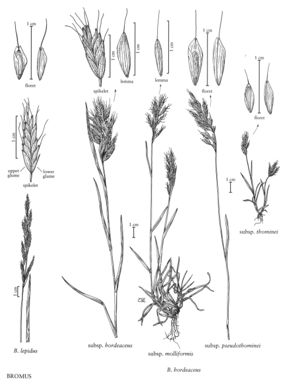familyPoaceae
subfamilyPoaceae subfam. Pooideae
genusBromus
sectionBromus sect. Bromus
speciesBromus hordeaceus
subspeciesBromus hordeaceus subsp. hordeaceus
Bromus hordeaceus subsp. hordeaceus
Treatment appears in FNA Volume 24. Treatment on page 232.
Revision as of 20:20, 16 December 2019 by FNA>Volume Importer
Culms (3)10-70 cm. Panicles (3)5-10 cm, usually with more than 1 spikelet. Lemmas (7)8-11 mm, usually pilose or pubescent, margins bluntly angled; awns more than 0.1 mm wide at the base, straight, erect. Caryopses shorter than the paleas.
Discussion
Bromus hordeaceus subsp. hordeaceus grows throughout the range of the species, being most prevalent in southwestern British Columbia, the western United States, and the northeastern coast.
Selected References
None.
Lower Taxa
None.
... more about "Bromus hordeaceus subsp. hordeaceus"
Colo. +, Nebr. +, Conn. +, N.J. +, N.Y. +, Wash. +, Va. +, Del. +, Wis. +, Idaho +, Mont. +, Oreg. +, Wyo. +, Pacific Islands (Hawaii) +, N.Mex. +, Tex. +, La. +, N.C. +, Tenn. +, Pa. +, Okla. +, Calif. +, Nev. +, Mass. +, Maine +, N.H. +, R.I. +, Alaska +, Ill. +, Utah +, Ark. +, Ind. +, Iowa +, Ariz. +, Md. +, Ohio +, Mo. +, Mich. +, N.Dak. +, S.Dak. +, Kans. +, S.C. +, Ky. +, Alta. +, B.C. +, Greenland +, N.B. +, Nfld. and Labr. (Labr.) +, N.S. +, N.W.T. +, Ont. +, Que. + and Yukon +
Present +
Introduced +
Bromus hordeaceus subsp. hordeaceus +
Bromus hordeaceus +
subspecies +
